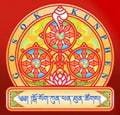Manibhadra, the « Happy Housewife », was one of the 84 Indian Vajrayana Mahasiddhas….
瑪尼巴札, »家庭主婦 »,是古印度金剛乘八十四大成就者之一….
瑪尼巴札亦名瑜珈女巴呼利,是阿噶市一位富人的女兒,十三歲時便與一名同種姓的男子訂婚,某日,上師固故利巴前來向瑪尼巴札乞食。瑪尼巴札疑惑固故利巴相貌俊美,卻穿著補丁衣裳,乞食為生,瑜珈士回答畏懼輪迴的道理,讓瑪尼巴札升起了信心,於是當晚夜半時分,來到固故利巴墓地裡的家中。固故利巴便授與她上樂金剛的灌頂。
瑪尼巴札在墓地中修持了好幾天才回家,她的父母親非常生氣的打罵她,但她已視其為法門。瑪尼巴札依照上師的指導專修儀軌,心離俗務。一年之後,其未婚夫前來迎娶,瑪尼巴札履行了世俗應盡的責任,後來生下一男一女。之後十二年之中未曾再見到上師。一日,在取水回家的路上,一棵樹倒下,將水壺打破了。瑪尼巴札站在那兒凝視破掉的水壺,然後她開口述道,接著躍升到空中,持續教導阿噶市人民二十一天後,便回歸空行淨土。(維基百科)
Manibhadra was the daughter of a wealthy family in Agarce. As was their custom, she was betrothed at the age of 13 to a man of her own caste. She lived with her parents until old enough to take up her wifely duties. One day, while in her mother’s kitchen, the guru Kukkuripa came to her house begging for food. She welcomed him and served him with her own hands. She then asked why he chose to be as he is now and not lead a comfortable life with a family. At that, the yogin laughed and explained the precious human birth as an opportunity to make spiritual progress and to free himself from the wheel of rebirth. Manibhadra’s faith was kindled and her trust of the yogin made her beg for him to show her the way to liberation. The yogin told her she could find him in the cremation grounds if she wanted more information, which was what she did that night.
Although she had never gone out alone at night, she walked fearlessly through the streets to the cremation ground. When she came upon the yogin’s hut, he welcomed her in. Recognizing the maturity of her mind and her sincerity, he gave her initiation and empowerment. Then he instructed her in the practice of Generation and Completion meditation. She remained in his hut alone for 7 days while she established herself in the practice of her sadhanas.
When she was no where to be found, her family grew frantic. When she finally returned, her parents beat her. With great calm, she defended herself stating that pure bloodline and fine reputation would not free her from samsara. She said she had been with her guru, who taught her how to practice a sadhana of liberation. At that, her parents were so impressed that they didn’t argue any further. On top of that, they allowed her to practice her sadhanas single-pointedly.
A year passed and it was time for her fiancé to claim his bride. The family was worried she would not fulfill her obligations. But she accompanied her husband to her new home with no complaint or resistance. She became a model wife, doing all and more than what was expected of her with a good attitude. In time, she gave birth to a son, and later, a daughter.
Twelve years passed in perfect harmony, and on the 13th anniversary of meeting with her guru, a tree root tripped her, causing her to break the water pitcher she was carrying. For the rest of the day, she was nowhere to be seen. Her family searched for her and eventually found her at the place she fell. When her husband spoke to her, she seemed totally unaware of his presence. She only had her eyes fixed on the broken bits of the pitcher.
Manibhadra remained immobile and silent until nightfall. Then she looked up, surprised to see so many people gathered around her. She then sang a song of realization:
From the beginning of time, sentient beings
Have broken their vessels, and their lives end.
But why do they then return home?
Today, I have broken my vessel.
But I am abandoning my samsara home
For the realms of pure pleasure.
How wonderful is the guru
If you desire happiness, rely on him.
Manibhadra levitated into the sky and remained there for 21 days, giving instruction to the people of Agarce. Then she bid farewell to her family and friends. She was assumed bodily into the Paradise of the Dakinis.
Mahasiddha Mahipa ||
大成就者 瑪希巴
84 Mahasiddhas ||
84 大成就者
Mahasiddha Medhini ||
大成就者 美狄納



